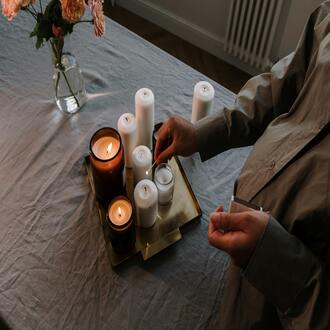Transcription Importance of freedom of choice
Freedom. A powerful word, a concept that encompasses many ideas and emotions. Individual freedom implies that we can decide autonomously on the fundamental issues of our lives.
According to the Royal Academy of the Spanish Language (RAE), among the meanings of freedom is: the natural faculty that man has to act in one way or another, and not to act, so he is responsible for his actions.
It is a concept that includes many types of freedom and among these, freedom of choice. Many would say that it is the only type of freedom that really exists for everyone. But freedom of choice does not necessarily mean that I have freedom of action, that is, the capacity to act, nor that I do it well or in my own interests.
Sometimes we even forget that we have this freedom, overwhelmed by all the commitments we are taking on, or because we prefer security and comfort over the life we want.
Have you thought lately about how you are exercising your freedom of choice? How many important decisions do you make... let's say per year? What area of your life do they impact? Deliberation (analyzing pros and cons) and decisions are part of freedom of choice.
If we want to grow as people we need to know what sustains and drives our decisions or else we will just automatically repeat the same old situations for the rest of our lives.
Freedom to decide
When making decisions we are guided by both our experience and that of others, so we are driven by emotions. Whether they motivate us or cause us to reject them. But either way we are forced to decide (even if you decide you don't want to decide you are deciding). If decision making is not a process in which you are constantly involved it means you are not progressing.
Obviously there are decisions and decisions. It is something we do every day, many are already automatic and unconscious. But there are others that are more important, where you have to mobilize many internal and external resources. It is natural that fear is one of the first emotions when facing an important decision.
We just have to be attentive to the reason behind that fear. In the long run, if fear takes over, it can paralyze and affect the person's ability to discern what may be the best course to follow. It also undermines their self-confidence. Choosing passive behavior such as doing nothing in order to feel safe and calm is counterproductive.
There is no way to guarantee that the decisions you make will be totally satisfactory. There are many variables involved and it is impossible to control them all. The opportunity to change is built, it is not a one-time thing.
It is best that the person:
- Confront the emotions of stress, anguish or anxiety generated by imagining all the negative consequences, and begin to focus on and appreciate the positive ones as well.
- Work on self-esteem and self-confidence so that he/she trusts his/her abilities, assumes responsibility and is not afraid of making a fool of him/herself or of what others think.
- To deal with thoughts that make the idea of failure or making a mistake unbearable.
- Reflect on the tendency to control that makes him overly cautious or perfectionist.
Freedom to change
An important choice involves a change or rather a set of them. So people can choose to take the plunge or stay as they are. Most people make a simple operation where they put on a scale on the one hand, what it costs to change (time, energy, work, risks, burden) and on the other hand, what it will cost to continue as they are. Most of the time they choose the latter because they do not focus on its value.
Sometimes we are so involved in certain situations and for so long that we no longer notice them, but rather act on autopilot. In this way we do not notice the magnitude of the damage or all that it encompasses. But we must ask ourselves, how much is this situation limiting us, how much is it taking me away from what I really need?
If you have something bothering you, going around in your head, tormenting you to the point that you cannot ignore it, an advisable exercise is usually to seek information to visualize the change in as much detail as possible. This does not imply any commitment and represents an advantage:
- You can look at the situation from different angles.
- You can analyze the options available and their scope.
- You can think about how to approach the situation, what resources are needed.
- You can assess the possible consequences, even the worst-case scenario.
- And above all, you can determine how you would feel without the problem.
- Although it is an inaccurate exercise and a figment of our imagination, it is based on real information. We take the time to reflect and plan.
- This puts us in a better position to make wiser decisions. It should not be just a five-minute fantasy or an obsession.
Freedom to follow our values
Each person has his or her set of values that determine his or her priorities. Values are our principles, the compass we use to guide us. They are the fundamental basis for designing our lives, or they should be. Understanding them prepares us to make better decisions. We don't really need more information
importance freedom




